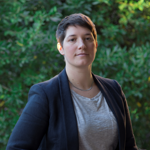People with experience of homelessness should guide our mission to prevent it

25.04.2022
Over the past few months, we partnered with organisations across Scotland to run focus groups to inform our response to the Scottish Government and COSLA’s consultation on preventing homelessness. We wanted to find out more about people’s experience of being at risk of homelessness, what matters most to them and how easy they found it to look for support.
Negative attitudes towards homelessness were a real barrier for some of the people we spoke to.
As one person told us: “There’s still a terrible stigma. You don’t go asking for help until you tend to be away over your head in it. Being more aware of who you can turn to would be really helpful, definitely.”
We conducted six of these focus groups across Scotland. They were made up of different people, with different experiences, from different parts of the country, yet the same messages rang through time and time again.
Some talked about seeking support, but not knowing where to turn to find it. Others asked for help, but were not able to get it because they were not yet two months away from facing homelessness. The same issues were revealed in a Crisis-Citizens Advice Scotland (CAS) analysis of homelessness cases over the last year, which also helped steer our consultation response.
In some cases CAS clients were told by various services – including local authority housing and homelessness services – that they would not be able to access support to resolve their housing situation until they became homeless.
The analysis was based on 185 cases from CAS between January 2021 and January 2022. In many of these cases it was clear that earlier intervention and more joined up support could have stopped more people from being pushed into homelessness.
This won’t represent a particularly surprising conclusion for anyone familiar with the homelessness system.
We’ve long known what the problem is: Scotland has some of the best protections in the world for people experiencing homelessness, yet 1 in 12 Scots has experienced homelessness. We need to stop homelessness from happening in the first place – and that’s why we support Scottish Government plans to strengthen homelessness prevention.
So what does Crisis want to see change? At their core the principles behind our consultation response are simple. People at risk of homelessness should be able to get help earlier, before they reach a point of emergency, and public services should take a wider responsibility for preventing people from being forced from their homes. That means there should be new duties for public bodies – such as in the justice system, or in health and social care – to ask about someone’s housing situation, then act to offer help if needed.
That will require services to listen to the person’s needs and give them meaningful choices over their options. This should include an open discussion with applicants about what they want, giving them a voice and a sense of control at a very challenging point in their lives. Crisis see personal housing plans as a critical part of the PRG’s package of proposals to achieve this.
None of this will be easy – we know that. This package represents the biggest change to the homelessness system in a generation.
There is huge potential for these proposals to offer savings to public services through an increased focus on early intervention, as well as preventing individuals from experiencing the trauma and indignity of homelessness. Meanwhile, the cost of doing nothing is clear – we continue as we are, with tens of thousands of people left trapped in temporary accommodation, without a place to call home.
Ultimately, though, it should be the voices of those with first-hand experience of homelessness that should guide Scotland in its journey towards building a better system, where people get the help they need and where needless trauma and suffering can be prevented.
As one person told us, the thing they would value most is someone taking the time to check how they are, and listen to what they need. “It sounds a bit silly, but they need to make sure the young person is actually alright. Obviously, if they’re coming to support from the Council, they’re probably not! Then to ask, have you reached out to anybody, is there any other support that you think you would need? Like, talking to you like a person, rather than a number.”
For media enquiries:
E: media@crisis.org.uk
T: 020 7426 3880
For general enquiries:
E: enquiries@crisis.org.uk
T: 0300 636 1967
